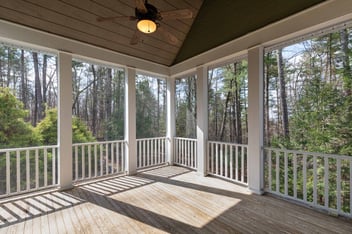3 Min Read
Builder-Direct vs. Big-Box Remodelers: Why it Matters for Your project
Renovating your home is one of the most rewarding investments you can make. Whether it’s updating a dated kitchen, creating a spa-like bathroom, or adding new living space, the right renovation can transform how you live and add lasting value. But choosing the right contractor determines whether your project feels smooth and inspiring—or stressful and disappointing.
In Wake County, homeowners often face two very different options: working with a builder-direct renovation company like Triple Crown Contractors or hiring a big-box remodeler that operates on volume. Both approaches promise results, but the difference lies in process, personalization, and long-term value.
This article explains what builder-direct really means, how it compares to big-box remodelers, and why the builder-direct approach is better aligned with the needs of today’s Apex, Cary, and Holly Springs families.
What Does Builder-Direct Mean?
Builder-direct renovation means you work directly with the licensed general contractor responsible for your project—not layers of salespeople, subcontractors, or outside managers. From your first consultation through final walk-through, the same dedicated team guides the process.
For Triple Crown Contractors, builder-direct is about personal communication and accountability. When you book a consultation, you meet the decision-makers who will be personally invested in your renovation. Weekly updates, milestone check-ins, and transparent budgets ensure there are no surprises.
In short: builder-direct means fewer handoffs, fewer breakdowns, and more trust.
What Do Big-Box Remodelers Offer?
Big-box remodelers—whether national chains or regional firms running dozens of projects at once—operate very differently. They often attract clients with recognizable branding, quick initial estimates, and packaged options.
This can sound appealing, but the experience is often impersonal. Projects are passed from a salesperson to a design coordinator to a subcontracted crew. You may speak to three or four different people over the course of your remodel, none of whom are directly responsible for your satisfaction.
While big-box remodelers sometimes complete projects faster or cheaper on the surface, the hidden trade-offs often include limited customization, inconsistent workmanship, and higher risk of change orders once work begins.
The Advantages of Builder-Direct Renovation
Personalized Service
Every project is unique. Builder-direct renovation companies prioritize understanding your lifestyle and tailoring designs to fit. At Triple Crown Contractors, that means not just creating a functional kitchen, but designing one that flows with how your family cooks, eats, and gathers.
Quality Over Volume
Because builder-direct firms take on fewer projects, each one receives more focus. Crews are not stretched thin across dozens of job sites. Quality control remains consistent from start to finish, and every detail gets attention.
Transparency and Trust
Homeowners want predictability. Builder-direct companies emphasize clarity with detailed proposals, good/better/best options, and weekly updates. Clients know what to expect at every stage, and the direct line of communication prevents misunderstandings.
Hyperlocal Knowledge
Unlike regional or national remodelers, builder-direct contractors are rooted in their communities. Triple Crown Contractors knows Apex, Cary, and Holly Springs permitting requirements, HOA rules, and neighborhood styles. This local expertise helps streamline approvals and ensures designs reflect the character of Wake County homes.
The Weaknesses of Big-Box Remodeling
High Volume, Low Attention
Big-box remodelers are built for speed and scale. Project managers often juggle many clients, limiting the attention your project receives. Small details that make a renovation feel personal are easily overlooked.
Limited Customization
Large remodelers often rely on standardized packages. Want something beyond their catalog? Expect delays, surcharges, or pushback. Builder-direct firms, on the other hand, design to your vision, not a preset template.
Impersonal Communication
Instead of talking to the person in charge, you’re often routed through coordinators or customer service lines. This can leave homeowners feeling like just another job on the schedule.
Inconsistent Quality
Work is frequently subcontracted out to crews with varying levels of experience. While some projects may turn out fine, others may suffer from rushed execution and inconsistent craftsmanship.
Hidden Costs
Low initial bids are a common big-box strategy. Once work begins, change orders and unexpected fees quickly add up, leaving homeowners frustrated with budgets that spiral out of control.
Real-World Experiences: The Contrast
Consider a typical Cary homeowner planning a bathroom remodel. With a big-box company, they sign with a salesperson who promises a quick timeline. By the second week, they’re dealing with subcontractors they’ve never met, delays from out-of-stock fixtures, and multiple unexpected costs. Communication feels scattered and accountability is unclear.
Now compare that with a builder-direct experience. The same homeowner meets directly with the builder, who reviews goals, budget, and timeline upfront. A clear proposal outlines every allowance. Weekly updates track progress. When a material substitution is needed, it’s discussed directly and resolved quickly. The finished bathroom reflects the homeowner’s vision and adds both comfort and value—without the stress.
Why Builder-Direct Fits Today’s Renovation Trends
The 2025 renovation market shows that homeowners are more selective. Families want ROI-driven projects, energy-efficient upgrades, and renovations that adapt to their lives—not cookie-cutter solutions.
Builder-direct firms are naturally better positioned to deliver on these demands:
- Smarter Renovations: Energy-efficient systems, rebate-eligible upgrades, and smart home integration tailored to each family.
- Cleaner Homes: Eco-conscious materials, healthier finishes, and waste-reduction practices built into the process.
- More Personal Service: Direct communication, transparent proposals, and locally rooted expertise.
These are exactly the values that define Triple Crown Contractors—and they align with what Wake County families are asking for right now.
Choosing Triple Crown Contractors
Choosing a renovation contractor isn’t just about price or speed—it’s about trust, accountability, and the value your project delivers long after construction ends.
Big-box remodelers may offer convenience, but their high-volume approach often sacrifices the very qualities that make a renovation successful: communication, customization, and craftsmanship.
By working with a builder-direct firm like Triple Crown Contractors, Wake County homeowners gain not only a partner in the renovation process but also a guarantee of smarter, cleaner, and more personal results.




%20(1)-1.jpeg?width=352&name=IMG_2910%20(1)%20(1)-1.jpeg)